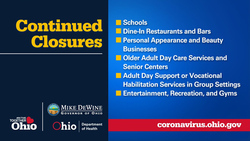On April 27, 2020, Ohio Governor Mike DeWine announced Ohio’s plan to restart Ohio’s economy during the COVID-19 pandemic. Governor DeWine’s plan involves phases with varying timeframes on when specific businesses and industries can reopen.
Beginning May 1, 2020
On May 1, 2020, there will be an opening of healthcare providers, which includes dentists and veterinarians. Accordingly, all healthcare procedures that do not require an overnight stay in a hospital can move forward. These procedures include regular doctor visits, well-care checks, well-baby visits, out-patient surgeries, imaging procedures, and diagnostic tests.
Healthcare providers and facilities that plan to resume providing these services must adhere to infection control practices, have sufficient personal protective equipment (PPE), and talk with patients about the risk of contracting COVID-19.
Beginning May 4, 2020
Manufacturing, distribution, and construction businesses may reopen on May 4, 2020, depending on the businesses’ ability to meet mandatory safety requirements for customers and employees. Mandatory requirements include ensuring a minimum of 6 feet between people. If this is not possible, barriers must be installed. Further, employees must self-assess symptoms, and employers must change shift patterns and stagger lunches to prevent congestion in single areas.
Also permitted to reopen beginning May 4, 2020, are consumer, retail, and services businesses. Again, mandatory safety requirements must be able to be met prior to reopening.
The last group of businesses permitted to reopen beginning May 4, 2020, are general office environments. General office environments must also meet mandatory safety requirements similar to manufacturing, distribution, and construction businesses.
Business Practices
The Governor also outlined five business practices for getting back to work:
- Recommend Face Coverings – Employees, clients, and customers should wear face coverings at all times.
- Conduct Daily Health Assessments – Employers and employees must self-evaluate to determine if they are fit to be at work. This includes taking your temperature prior to going to work, and if you do not feel well, you must stay home.
- Maintain Good Hygiene – Employees and employers must continue to wash their hands frequently, use hand sanitizer, and practice social distancing.
- Clean and Sanitize – Workplaces must clean and sanitize throughout the day and at the close of business or between shifts.
- Limit Capacity – Workplaces must establish a maximum capacity, which cannot be above 50% of the fire code guidelines. Workplaces should also use appointments where possible to limit the number of customers and clients within the building.
Continued Closures
While many businesses will slowly begin to reopen, the following are businesses and entities that will remain closed until further notice from the Governor as per a recent Twitter notice:
[Source: https://twitter.com/GovMikeDeWine/status/1254920564831129600/photo/1]
Included in the above-listed continued closures are:
K-12 schools and daycares.
- Restaurants and bars (excluding carry-out and delivery).
- Hair salons, day spas, nail salons, barbershops, tattoo parlors, body piercing locations, tanning facilities, massage therapy locations, and similar businesses.
- Older adult day care services and senior centers.
- Auditoriums, stadiums, arenas.
- Movie theatres, performance theatres, and concert and music halls.
- Public recreation centers and indoor sports facilities.
- Parades, fairs, festivals, and carnivals.
- Health clubs, fitness centers, workout facilities, gyms, and yoga studios.
- Swimming pools, whether public or private, except swimming pools for single households.
- Campgrounds, including recreational camps and recreational vehicle (RV) parks.
If you have any questions, please contact Attorney Michael J. Bogdan (mbogdan@www.kwgd.com).
NOTE: This general summary of the law should not be used to solve individual problems since slight changes in the fact situation may require a material variance in the applicable legal advice.

